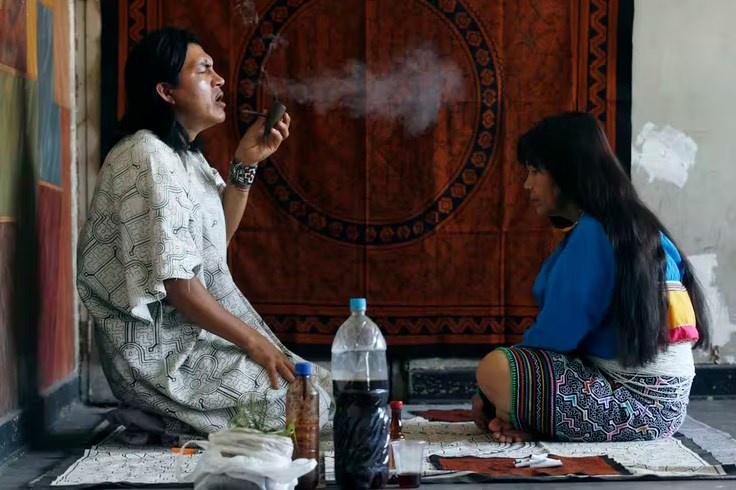A trip-sitter[i][ii] is someone who looks after a person who is tripping. The position can be as simple as standing by to offer assistance (if the tripper wants to go somewhere but should not drive, for example) and to respond to any emergencies. Alternatively, trip-sitting can expand into an almost shaman-like role, guiding the person through preparation, dosage calculation, tripping, and integration afterwards.
Most commonly, a trip-sitter is a companion who can talk the tripper through difficult patches and recognize and respond to an emergency, should one arise.
Turning off the stove (if the tripper got distracted and forgot) could be important, too.
Deflecting the attentions of overly-curious neighbors could help as well.
Having a trip-sitter is on the list of recommended safety procedures for any experience with psilocybin or other equivalent substance.
Please note that even if the trip-sitter does not help with preparation and integration, somebody should. Beginners should have help with preparation because they might not otherwise know how to have a safe and meaningful experience—you don’t know what you don’t know, as they say. Both beginner and experienced trippers should have help with post-trip integration, though the nature of the assistance might differ depending on the experience level and needs of the tripper. Integration makes the difference between an experience that feels profound and one that actually is profound and transformative.
Do I Need a Trip Sitter?
Short answer? Yes.
Slightly more nuanced answer? Yes, probably.
Trip sitters are essential helpers to first-timers, whose reaction to psilocybin can’t really be predicted and who may not understand how to create the kind of set and setting critical to a good and productive trip.
Some writers claim that experienced psychonauts don’t need trip-sitters—and indeed many do go it alone and are just fine. However, lots of people drive without seat-belts and are fine, too. A safety precaution is usually something you can do just fine without until all of a sudden you can’t.
The issue is that while psilocybin is a relatively safe way to alter the mind, it is not risk-free. Even if somebody knows how to ride through a scary or difficult trip, the possibility of a dangerous side-effect, such as convulsions or paralysis, is never zero. And then there is the possibility of nosy neighbors or even law enforcement. Having a trip-sitter on-hand can make the difference between a life-threatening situation and a safe and meaningful experience.
Some trips should be solitary—the heroic dose specifically is supposed to be taken alone, at least according to some. But “solitary” doesn’t have to mean “beyond the reach of help.” A sitter can wait in another room. If all goes well, the voyager never has to see or hear them and can more or less pretend they aren’t there.
If something goes wrong, it doesn’t have to be a disaster.
Since a trip sitter is usually an experienced psychonaut they can also be a great resource for finding the best way to take shrooms (for you) and guiding you towards the things you should do when on shrooms.
Do I Need a Professional Trip-Sitter?
Whether you need a professional sitter depends on what you mean by “professional.” The word has connotations of competence and expertise, and is therefore sometimes used simply to refer to the quality of someone’s work. But the strict definition is that a professional is someone who gets paid, as opposed to an amateur, who does it for love (the word is from the Latin, amare, “to love”). Remember that the great fictional detective, Sherlock Holmes, always described himself as an amateur.
So if you mean “do I need a trip-sitter who charges money,” no, you do not. There are indeed professional trip-sitters, as well as volunteers who have been trained by professionals[iii]. But the service is not regulated; there is no trip-sitting license, no governing body equivalent to the American Medical Association to ensure a certain level of professional quality. There is nothing to stop somebody charging money for trip-sitting who has no qualification at all. And there is no reason a person can’t study on their own and become an entirely competent, expert sitter.
What you need is a trip-sitter who is knowledgeable and competent, with a lot of relevant experience. If that’s what you mean by “professional,” then, yes. And looking for somebody who makes their living trip-sitting and who is well-regarded by their clients is a good way to find such a person—you just still have to do your due diligence to ensure the professional really is everything you should be. But the right volunteer or the right amateur expert might be just as good.
If you can’t find an experienced expert, asking a compassionate friend to sit with you is far better than nothing. The thing to avoid is people who are “amateurish,” those who fail to take trip-sitting seriously and pretend (possibly even to themselves) to have expertise that they really don’t.
Where Can I Find a Trip-Sitter?
If you do an online search for “where can I find a trip sitter,” the first page of results will include the websites of various agencies that offer trip-sitting services, either in-person or remotely. You’ll also get people who will watch your dog while you go visit Florida and so forth. Search engines are not perfect, but they do help.
Of course, there are trip-sitters who don’t advertise online or otherwise. Some are amateurs who sit mostly with friends and acquaintances. Others are professionals who want to keep a low profile—although sitting with somebody who is using an illegal substance is not itself illegal, not everybody wants to be publicly associated with criminal activity.
Word-of-mouth can be an effective way to find someone. If you’re at a public event, such as a music festival, where use of psychoactive drugs is anticipated by the organizers, there may be trip-sitters working the event, just as there will be emergency medical staff and security. Look for their tent or ask around.
How to Be a Good Trip Sitter
What it means to be a good trip-sitter varies because the needs of trippers vary, but there are a couple of common elements. You must:
- Be sensitive to and able to respect boundaries (does the voyager want to voyage alone today?)
- Be there for the voyager without getting bored, critical, or judgmental
- Be able to recognize a true emergency—calling 911 if you don’t have to could be very bad, but not calling if you do have to would be even worse
As noted earlier, the trip-sitter role can be little more than just literally being there, or it can involve offering skilled guidance and even therapy. The latter might be ideal for many, especially for beginners, but very few people are qualified to provide such advanced support. If you’re not qualified, it’s better not to try. Just offer the support you can provide.
More experienced trippers might still benefit from active guidance, or they may prefer to be more independent. Unwanted assistance could be intrusive and disruptive. For some people, less is more, and the ideal trip-sitter is the one who knows how to be unobtrusive.
Opinion differs as to what sort of experience with tripping the sitter needs to have. Some claim that a trip-sitter is, by definition, sober, while others say that taking a light or moderate dose will help the sitter empathize with the tripper better. Some insist that a trip-sitter be an experienced psychonaut, others say that it’s fine to trip-sit even if you’ve never taken a dose in your life, that you can learn everything you need to learn by reading. Most people seem to agree, though, that a trip sitter should be an experienced psychonaut but should be completely sober while trip-sitting.
A shared trip can be a lovely and intimate thing, but sharing a trip is not the same thing as trip-sitting.
There are resources available for people interested in learning how to trip-sit, including articles, check-lists, and other information. Please make a point of getting information from genuine experts in the subject
Checklist
This is a good checklist to reference when trip sitting.
Medical Info
Does the tripper have any physical or medical ailment?
❏ If yes, check with a medical professional for interactions
❏ Is the tripper on any medicine?
❏ If yes, check with a medical professional for interactions
❏ Does the tripper, or their relatives, have a history of psychosis, schizophrenia, or bipolar disorder?
❏ If yes, this escalates the risk of taking psychedelics immensely, so I thoroughly recommend they don’t take psychedelics.
❏ Are you take psychedelics to ‘face turmoil’ in your life, look for darkness, or would others describe you as mentally unstable?
❏If yes, this escalates the risk of taking psychedelics immensely, so I thoroughly recommend they don’t take psychedelics.
Preparation tripper
Substance
❏ Does the tripper know about the drug?
❏ Duration
❏ Dose
❏ Has the source of the drug been tested? Is it reliable?
❏ Effects for the dosage?
❏ How were previous trips on this drug?
Set
❏ Does the tripper have a purpose?
❏ Any specific expectations?
❏ Has the tripper read any background information?
❏ Have you read good and bad trip reports?
❏ Has the tripper planned enough?
❏ (Day) Before to relax, reflect, and otherwise prepare
❏ Day of trip: Zero commitments
❏ Day after: Process your experience
❏ Is the tripper in a good state of mind?
❏ Any neuro issues? (Ex. Autism, Anxiety, Depression, Bipolar etc…)
❏If yes, check with a medical professional for interactions
Setting
Music
❏ Have you prepared 8-12 hours’ worth of trip appropriate music?
❏ Do you have headphones?
❏ Turn phone notifications off
❏ Turn phone on airplane mode
❏ Have you taken a poop prior?
❏ Do you have a Safe place?
❏ Will your safe place avoid interruptions by unwanted people? (Ex. Family, Friends, Police)
❏ Did you clean or tidy up the environment of your safe place?
❏ Do you have activities planned?
❏ Do you have easy to eat/drink foods available? (Ex. Cheese and Crackers, Juice Boxes, Lunachables) Don’t cook while under the influence.
Preparation sitter
❏ Has the sitter read about trip sitting or had previous experience?
❏ Be supportive (i.e. a sitter), not a guide
❏ Talk the tripper through their trip, not away from it
❏ In case of an emergency
❏ Does the sitter know the trippers emergency contacts?
❏ Does the sitter know the Music requests of the tripper?
❏ Is the sitter aware of the drug and its potential effects?
❏ Has the sitter made sure there is enough food available for both the sitter and the tripper and if the food is easy to prepare.
❏ Is the sitter familiar with the safe place and knows where to find everything? (Ex. Fire Extinguisher)
❏ Has the sitter talked about communication guidelines with the tripper?
❏ Is the sitter experienced practicing sobriety?
❏ Has the sitter prepared silent (non-disturbing) content for themselves?
❏ Does the sitter have a comfortable place to relax/sit?
❏ Is the sitter in a good frame of mind?
Relationship between tripper & sitter
❏ Does the tripper feel relaxed, open and vulnerable with the sitter?
❏ Does the Tripper have any requests? (Ex. Remind me reflect on…)
❏ Does the safe place have toilet access?
❏ Does the tripper want the sitter in the washroom with them?
❏ Does the tripper want communication questions?
❏ “Describe where you are in your experience right now?”
❏ Are there any obscure wishes for the sitter?
❏ Does the tripper want the sitter to take notes?
❏ Does the tripper want to go outdoors after the peak of the experience?
References:
[i] Janikian, M. (2019). Your Psilocybin Mushroom Companion
[ii] Tripson, DM (n.d.). The Ideal Trip Sitter. ShroomCircle
[iii] Kazdin, Cole (2018). For $1,000, These ‘Sitters’ Will Save You from a Bad Acid Trip. Vice



